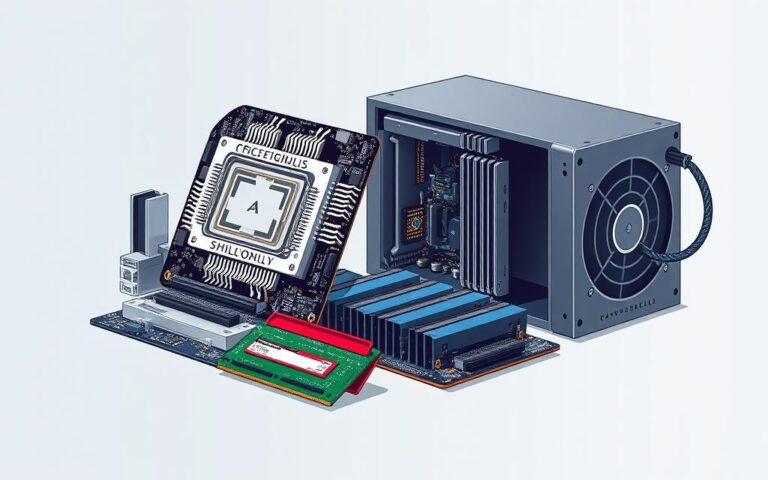Exploring the Role of a Computer System Technician in Networking
The role of a computer system technician is crucial for computer networks in modern organisations. They play a key role, making sure networks run smoothly. Networks are essential for the success of any business. The need for these experts is growing by 6 percent from 2023 to 2033 in the US. This shows how important skilled network technicians are for managing complex networks.
Network technicians are often called the “unsung heroes” of network operations. They deal with setup, fixes, and keeping networks running well. With an average pay of $72,509 a year plus bonuses, this career offers good money and satisfying work.
In today’s digital world, having strong networks is key. Computer system technicians play a vital role. They keep the IT systems working well, linking organisations, workers, and customers.
The Essential Duties of a Computer System Technician
Computer system technicians have many important tasks. They keep computer networks working well. This helps everyone in an organisation talk to each other and share data easily. As more people need these skilled workers, knowing what they do is key. This includes setting up and protecting networks.
Installation and Configuration
Firstly, they are in charge of putting in and setting up network gear. Technicians install routers and switches. They make sure everything works as it should. Setting up network settings and installing software are also part of their job. This helps keep the connection stable.
Troubleshooting and Maintenance
Fixing network problems is another big part of their work. They look for and sort out any issues. These could be from wrong settings, broken hardware, or software bugs. Regular checks help stop network problems. This makes sure the network always runs well.
Network Security Management
Keeping the network safe is very important today. Technicians set up security steps like VPNs and firewalls. This keeps important data safe. They always watch for dangers online. And they work to keep the organisation safe from cyber threats.
Vendor Management and Documentation
Handling vendors is also crucial. Technicians talk with vendors, manage contracts, and get needed tools on time. They also keep detailed records of the network setup. This information is useful for fixing future problems and for training.
Key Skills Required for Success
Being a computer system technician in networking is tough but rewarding. You need a wide range of skills to manage different problems in our fast tech world. These skills help technicians do their job well and improve. It’s important to learn and understand these skills if you want to be successful in this career.
Technical Proficiency
Computer system technicians must know a lot about technical skills. They need to understand network protocols, hardware, and software. They often set up and fix network systems. They must know the OSI model and TCP/IP protocols well. This knowledge is key for good network communication. Staying up-to-date with tech changes, like through Cisco CCNA or CompTIA Network+, is crucial for success.
Problem-Solving Abilities
Solving problems is at the heart of a technician’s job. They need to quickly find and fix problems to keep downtime low. This requires strong analytical skills to spot the main issues and solve them fast. Technicians have a lot of work and must be good at solving problems. This helps them handle many tasks well without losing quality. To learn more, check out this article on important skills in the field.
Communication and Teamwork
In IT, being good at communication skills in IT is key for working well with others. Technicians talk to coworkers, clients, and stakeholders often. They need to explain complex tech stuff in easy ways. Being good at talking to others helps teams work better together. Important communication skills include listening well, understanding others, and reading body language. Getting better at these skills helps with customer service and team bonding.
| Skill Category | Core Skills | Relevance |
|---|---|---|
| Technical Proficiency | Networking protocols, hardware knowledge, software applications | Fundamental for configuration and troubleshooting |
| Problem-Solving Abilities | Analytical skills, quick diagnosis, effective resolution | Minimises downtime and operational disruption |
| Communication and Teamwork | Active listening, clear communication, empathy | Enhances collaboration and customer service |
What is Computer System Technician Networking?
The role of a computer system technician in networking is vital for keeping an organisation’s tech running smoothly. They look after many jobs, like fixing problems and ensuring the network is safe. This role shows us how important it is in IT departments.
Understanding the Role
Computer system technicians are key in looking after an organisation’s network. They do hands-on work and support the design of the infrastructure. This helps keep networks working well and safely. They work closely with senior network specialists to make sure everything operates without a hitch. About 75% of their work focuses on solving system and network issues. This emphasizes the hands-on nature of their job.
The Importance of Networking Skills
For computer system technicians, being good at networking is crucial in today’s tech world. It lets them keep up with new tech and find the best ways to keep communication flowing. Their skills are essential for planning and running important projects. For example, technicians spend about 20% of their time keeping the internet going. Another 15% goes towards helping others with tech issues. These tasks show how critical they are to any business.

| Task Category | Percentage of Time Spent |
|---|---|
| Troubleshooting Errors | 75% |
| Maintaining Internet Connectivity | 20% |
| Providing Technical Support | 15% |
| Monitoring System Performance | 10% |
| Installing New Hardware/Software | 5% |
| Training Employees on New Systems | 5% |
Career Path and Advancement Opportunities
The career path for computer system technicians offers lots of options, especially for those keen to progress. To move up in the IT world, knowing about entry-level requirements and various certifications is crucial. These steps are key to unlocking better positions and chances for growth in this sector.
Entry-Level Qualifications
If you’re looking to start in this field, certain basic qualifications are necessary. For many newcomers, certifications like CompTIA A+ or Network+ are the first steps. They cover essential skills for solving common problems and managing networks. Getting these certifications lays the groundwork for future success.
Certifications and Their Impact on Career Growth
Getting more certifications can really boost your career in IT. For example, earning Cisco’s CCNA or CompTIA Security+ helps improve your skills and proves your expertise in important areas. These qualifications can lead to higher positions, like network engineer or systems administrator. There’s a wide range of certifications for different tech fields, offering many paths to specialize.
| Certification | Focus Area | Impact on Career |
|---|---|---|
| CompTIA A+ | Technical Support | Foundation for IT roles |
| Network+ | Networking Fundamentals | Skills for network management |
| CCNA | Cisco Networking | Advanced networking roles |
| CompTIA Security+ | Cybersecurity Basics | Entry into cybersecurity field |
| MCSE | Microsoft Solutions | Higher level Microsoft administration |
| AWS Certified Solutions Architect | Cloud Architecture | Roles in cloud computing |
Having specializations in security, cloud computing, and server management can greatly improve your career prospects. These advanced areas not only offer more job options but can also lead to better pay. People with higher certifications usually find more opportunities and financial benefits.
Conclusion
The job of a computer system technician in networking is vital for today’s organisations to run smoothly. They have important duties to keep networks secure, fast, and ready for new technology. Skilled technicians are in high demand because they need to be good at technology, communicating, and solving problems. These skills are key to do well in different networking roles in IT.
Jobs for computer support experts are expected to grow by 8% between 2019 and 2029. A computer technician can earn up to $65,175 a year, showing how much their skills are worth. With chances to specialise and improve their skills, newcomers to this field can expect exciting and fruitful careers in a tech-centric world.
This summary highlights how critical networking technicians are across all sectors, including businesses and government bodies. As technology moves forward, their ability to adapt and keep learning will make sure they stay relevant. It will also increase their impact on the success and efficiency of organisations.
FAQ
What are the main responsibilities of a computer system technician in networking?
The key tasks of a computer system technician in networking include setting up network devices and solving problems. They also manage security measures and handle documents and vendor relations.
What skills are crucial for a successful computer system technician?
Important skills for this job are knowing a lot about networking and being good at solving problems. Being able to work well with others and explain complicated stuff in simple terms is also vital.
What qualifications do I need to become a computer system technician?
Starting out, you should have basic certifications like CompTIA A+ or Network+. Getting more advanced certificates, such as CCNA or CompTIA Security+, can really help your career and pay.
How important are networking skills for computer system technicians?
Networking skills are very important. They help technicians keep up with fast-moving tech, put in place great solutions, and work on important projects that help the business run smoothly.
What career progression opportunities exist for computer system technicians?
As you move ahead in your career, you could become a network engineer or administrator. Studying more and getting higher certifications helps grow your career and take on more important roles.
Why is network security management a significant duty for technicians?
Keeping the network safe is key because cyber threats are on the rise. Technicians set up security stuff like firewalls and VPNs to keep data safe and secure.















